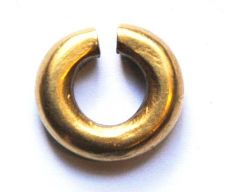Bronze Age
The Bronze
Age covers a period in man's history roughly 1000 to 2000 years BC
following on from the Stone Ages when man learnt to smelt bronze.
The technique was believed to
have been brought by the Beaker People who migrated to the Eastern
Coast of UK from Normandy in France.
Bronze not only allowed more
sophisticated tools and weapons but for the first time it allowed
decorative items like broaches as well as embellishment on weapons.
Eastern Essex provided a home
for bronze age man although given the shorter period of the age
there have been many fewer
artefacts found than those for the stone age.
Bronze age landing stages
have been found on the Blackwater at Mayland and on the Crouch at
Bridgemarsh Island indicating a use of the rivers for fishing and
possibly trade in the bronze age. The landing stage at Bridgemarsh
Island also has indications of wood being laid on the approach to
the landing stage which may have been a way of beating the effects
of the river mud in this area.
This use of the River is also
indicated by recovery of a bronze age oar on the opposite bank of
the Crouch at Hullbridge.
Althorne
Remains of a structure with 5
posts. The use of the structure is unknown.
Asheldham Camp
Bronze age pottery

Burnham on Crouch
In 1976 men working on a
sewer trench in Dorset Road, Burnham on Crouch found human bones and
bronze age pottery in undisturbed clay about 8 feet from the
surface.
Six axes which were so fine
that they are now in the British Museum
St Lawrence
Fine arrowhead and whetstone
with hour glass markings



